Bad news for plastics recycling: negotiators have failed to reach an agreement on a global treaty to combat plastic pollution during crucial talks in South Korea.
The negotiations, which involved representatives from more than 170 nations, were intended to conclude with a final agreement during the session being held at Busan ahead of a treaty signing in 2025. However, it has been decided that discussions will continue next year, reflecting the complexity of the issues.
Oil producers oppose
According to media reports, more than 100 countries want measures in the treaty to limit plastic production as well as legally binding controls on chemicals used in its manufacture. However, several key nations, particularly those that produce plastic or are major exporters of oil and gas, remain opposed to such strict measures.
They have also insisted that unanimous agreement was needed among the participating countries before key aspects of any treaty could be signed.
This fifth round of talks marked the largest gathering in the treaty’s history with more than 3 300 participants, including representatives from nearly 450 organisations.
Low ambitions
The Bureau of International Recycling considered progress on the treaty during its convention in Singapore in October. Environment director Alev Somer told delegates BIR was aligned with ‘high ambition’ countries who challenged the unsustainable production of primary plastic polymers.
They also argue for a range of measures including mandatory recycled content targets, more eco-design, financial mechanisms and incentives, and restrictions on hazardous substances. Progress was being undermined by the ‘low ambition’ countries led by oil producers.
At the convention, Somer said: ‘The most contentious issue …revolves around defining the full life cycle of plastics and whether [the agreement] should include the primary producers. Basically, the primary producers are suggesting, if this is going to be a legally binding instrument, keep us out, we want to be exempted.’
Don't hesitate to contact us to share your input and ideas. Subscribe to the magazine or (free) newsletter.



